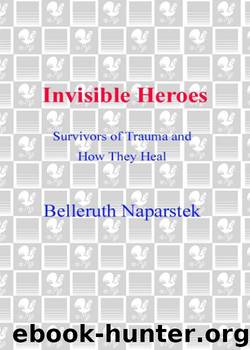Invisible Heroes: Survivors of Trauma and How They Heal by Belleruth Naparstek

Author:Belleruth Naparstek [Naparstek, Belleruth]
Language: eng
Format: epub
Tags: Fiction
Publisher: Random House Publishing Group
Published: 2007-12-17T23:00:00+00:00
POINTERS FOR THE NARRATOR
VOICE
If we’ve learned anything from accumulated feedback over the past decade and a half, it’s that, as important as your words are, they will never be as critical as the quality of your voice and the intention behind it. Most people start out a little too fast, high-pitched, and too effortful, but usually after reading a few paragraphs they automatically slip into the relaxed cadence and gentle flow of their own natural rhythm and timbre, which is so essential to effective guided meditation.
If you are creating a recording, the best thing to do is to keep on going and then go back and rerecord the beginning to match your now-slowed-down, more natural pace. If you are reading to someone, chances are they have also started out a little too speedy, and you’ll just be starting where they are and slowing them down along with you into a more relaxed, immersive pace.
The most important thing to remember is to speak naturally, the way you would to a friend sitting next to you, during a relaxed, quiet conversation. Your voice is low and soft, the way it always is when you are relaxed. (The more tense we are, the higher our pitch.) This not only entrains a calmer pacing but encourages listeners to match you by getting their awareness back down into their bodies, through the example of your own low, embodied voice. Under these conditions, even if your voice is somewhat strained starting out, your throat will relax and you will probably wind up sounding fairly smooth.
This is not a dramatic reading, so you want to be free of artifice and emotional punctuation. In fact, you very much want to keep out of the listener’s way by maintaining a fairly even emphasis—they’ll know for themselves what content needs their attention and what is irrelevant, and they will supply their own emotional flavoring. Your voice is there to provide a quiet, trustworthy, undistracting platform from which the listener can access his or her unique reactions and responses. So your voice can’t be calling attention to itself. Neither should there be even a hint of seductive, manipulative, or controlling flavor. Have some other people listen to it as a check if you are not sure about the tone you are communicating. It goes without saying—but I’ll say it anyway—that the last thing on earth you want to be doing is issuing an unconscious sexual invitation to your listener.
Of course, if you are recording in a studio or using a good microphone, you have ideal conditions for communicating a gentle intimacy. Your voice can be as soft and low as you please, and the microphone will take care of the volume.5
A personal supply of room-temperature water, tart Granny Smith apples, and throat-soothing tea with honey and ginger revives even the weariest, scratchiest voice. Keep away from the lemons, though. They may appear to be helping your voice initially, but ultimately they will dry out your throat.
MUSIC
Music plays a powerful and underappreciated
Download
This site does not store any files on its server. We only index and link to content provided by other sites. Please contact the content providers to delete copyright contents if any and email us, we'll remove relevant links or contents immediately.
Should I Stay or Should I Go? by Ramani Durvasula(7642)
Why We Sleep: Unlocking the Power of Sleep and Dreams by Matthew Walker(6689)
Fear by Osho(4724)
Flow by Mihaly Csikszentmihalyi(4680)
Rising Strong by Brene Brown(4444)
Why We Sleep by Matthew Walker(4426)
The Hacking of the American Mind by Robert H. Lustig(4361)
How to Change Your Mind by Michael Pollan(4346)
Too Much and Not the Mood by Durga Chew-Bose(4332)
Lost Connections by Johann Hari(4166)
He's Just Not That Into You by Greg Behrendt & Liz Tuccillo(3874)
Evolve Your Brain by Joe Dispenza(3659)
The Courage to Be Disliked by Ichiro Kishimi & Fumitake Koga(3475)
Crazy Is My Superpower by A.J. Mendez Brooks(3386)
In Cold Blood by Truman Capote(3374)
Resisting Happiness by Matthew Kelly(3332)
What If This Were Enough? by Heather Havrilesky(3302)
The Book of Human Emotions by Tiffany Watt Smith(3287)
Descartes' Error by Antonio Damasio(3264)
